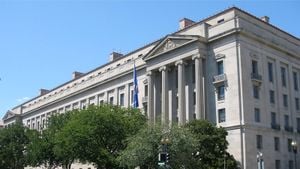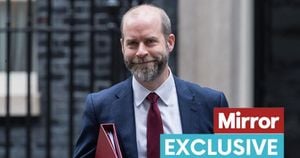Kenya made headlines this week with the cancellation of major agreements with the Adani Group, one of India’s largest multinational companies, following serious allegations against its founder, Gautam Adani. President William Ruto announced this decision during his State of the Nation address, citing new information provided by investigative agencies and partner nations as the impetus for this abrupt move.
The deals, valued at over $2.5 billion, included plans for the Adani Group to expand Jomo Kenyatta International Airport, the country’s main airport, by constructing a second runway and upgrading the passenger terminal. The ambitious project was originally put forward as part of Kenya's efforts to modernize its transport infrastructure, enhancing both capacity and efficiency.
Ruto directed relevant agencies within the Ministry of Transport and the Ministry of Energy and Petroleum to immediately halt all procurement processes associated with these contracts. He stated, “I have directed agencies within the ministry of transport and within the ministry of energy and petroleum to immediately cancel the procurement,” which received enthusiastic applause from lawmakers present during his speech.
This decision follows the indictment of Gautam Adani and seven affiliated parties by U.S. authorities, who claim they agreed to pay around $265 million to Indian government officials as part of corrupt practices. Adani, who is among the wealthiest individuals globally, has vehemently denied the allegations, labeling them as baseless and expressing his intention to contest the charges through legal avenues.
The airport project began generating interest back in March, when it was proposed without the traditional competitive bidding process, which raised eyebrows among critics. The proposal didn’t come to public attention until it was leaked via social media several months later, leading to significant scrutiny.
Despite initial support for the agreement among Kenyan officials, the tide shifted following mounting criticism from lawmakers and the public over potential corruption and lack of transparency. Commentators pointed to concerns about whether such expansive contracts would deliver adequate value for taxpayer money.
Alongside the airport deal, the Ruto administration has also pulled out of a separate $736 million public-private partnership with the Adani Group for the construction of power transmission lines. Energy Minister Opiyo Wandayi sought to assure the public by stating there were no allegations of bribery related to this contract. He emphasized, “There was no bribery or corruption involved,” reiterations aimed at alleviating fears surrounding the broader dealings with the Adani Group.
The backdrop to this cancellation is complex. The Adani Group has faced severe scrutiny for its business practices following allegations mostly spotlighted by U.S. short-seller Hindenburg Research, who claimed the conglomerate engaged in corruption and improper governance practices. These allegations were categorically denied by Adani and his associates.
These recent developments have mushrooms, with Kenyan courts expressing skepticism about the airport lease terms back in September, leading to a temporary halt on the agreement based on claims it lacked sufficient taxpayer value. The Kenyan legal system's actions underscored concerns about accountability and the integrity of foreign investment contracts.
Ruto's decision is likely to have immediate political and economic repercussions. Canceling such high-profile contracts not only reflects serious governance concerns but also sends shockwaves through potential foreign investors, who may reconsider the risks associated with such ventures.
While the Adani Group representatives were slow to comment following the cancellations, the group's response to these legal challenges and public perceptions will be closely monitored. The outcome of these allegations, along with Kenya’s response, will play pivotal roles moving forward.
On one hand, Ruto's administration is attempting to bolster its reputation for transparency and accountability but faces the challenge of maintaining economic growth and attracting foreign direct investment. The commitment to upholding integrity may resonate well within the Kenyan political arena but could deter potential partners wary of the changing tides of governance.
The fallout from this high-profile cancellation and the accompanying scandal serves as a case study of the delicate balance nations must manage between fostering lucrative international partnerships and ensuring rigorous adherence to ethics and legality.
With the broader public also keeping close tabs on these developments, the Ruto government is under intense scrutiny. The events will likely influence Kenya’s international image and its position as a destination for future investment. The Adani Group, having refuted the claims against it, is now faced with the task of rehabilitating its reputation not just on the global stage but also within India and across Africa.
Ruto’s assertive steps signal not just regional political maneuvering but also reflect broader trends of scrutiny over foreign investments amid crackdowns on corruption. While the future of the contracts with the Adani Group hangs precariously, the political ramifications within Kenya will influence governance structures and international business operations for the foreseeable future.
Moving forward, both the Adani Group and the Kenyan government will likely engage intensively with legal channels and diplomatic discussions as this situation continues to unravel. The global business community will undoubtedly watch these developments closely as they may herald significant shifts within corporate governance and international trade ethics.



